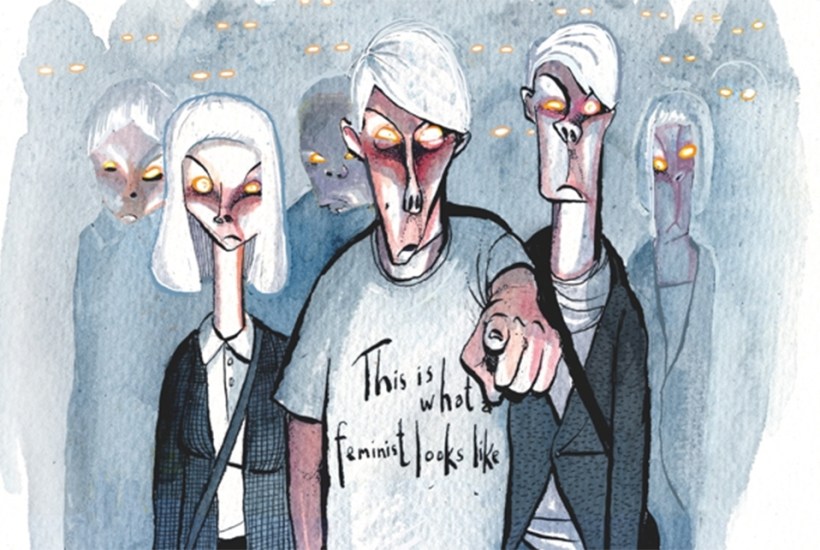Two very brief excerpts from Radio 4 last week. First, my wife turned on her radio in time to hear an actor in the afternoon play utter the words: ‘But Bob, you’ve been helping young disadvantaged black kids all your life!’ At which point, she turned off. Two days later I switched on my car radio and the display announced a ‘radical updating of Oliver Twist’ and I had just enough time to hear an actor say something like: ‘Quick, come quick! Babatunde has been shot in de leg by de gangs!’ before I too turned off. They are nothing if not psychotically obsessive at Radio 4, I think. It is worth tuning in for three seconds every few hours at random just to see what gratuitous wokery they are spraying in our direction – before switching over to something else, anything else.
People wonder where wokery has come from and those on the alt-right are often inclined to put it down to some ectoplasmic thing called ‘Cultural Marxism’. I have my grave doubts. Marx was both empirical and famously collectivist, while progressive politics is individualistic and post-rational. In the late autumn of this year I was asked by the New Culture Forum to deliver the Smith Lecture in front of a few hundred people in London and took as my topic the origins of this asinine creed, wokery. (I don’t know who Smith is, by the way. It wasn’t Adam, nor Jacqui, nor W.H. Perhaps it was named in honour of George Smith, a combative midfielder who played for Middlesbrough at the turn of the 1970s and a little later for Birmingham City.)
My conclusion was not a particularly happy or useful one. What we call wokery does not have a proper ideological base because it is incoherent and often contradictory: you would need to be on very good-quality acid to unite its various strands into a semblance of semantic order – and it still wouldn’t make sense. Instead, we have created it unwittingly, without thinking, over the past 50 or 60 years and as such only have ourselves to blame. It is, beyond all else, a creature of affluence, comfort and security: nobody in Somalia or Chad gets terribly worked up if you misgender them. The consequence, then, of cosseting.
The young generation which has taken progressive politics to its heart is the most affluent the world has ever seen, the most mollycoddled and the least at risk from warfare. Even within our society, just as in the USA, wokery has little or no purchase among the poor or the working class and instead thrives in areas populated by the wealthiest – our university cities, for example. Further, it is the most affluent of universities which most gladly embrace every and any woke idiocy which hoves into view: Oxford, Cambridge, Durham – not Teesside Poly. It is all a means by which the middle class can differentiate themselves from the working class and look down upon them (much as with Brexit, of course).
The rapid rise of Health and Safety is a contributory factor, its language utilised by social justice warriors on the campuses and beyond. They insist that they merely wish to be ‘safe’ by not reading Macbeth or listening to Douglas Murray give a speech. We might add into the mix that other growth industry, Human Resources, where the focus is always on the individual at the expense of the majority and the response to whining complainants of ‘Can’t you just get on with it?’ is no longer acceptable. Increasingly, these days, industry seems to exist to nurture individuals and cater to their whims, rather than to actually, y’know, make things.
In our schools we have seen a shift away from the acquisition of knowledge towards how one feels about stuff, how one might interpret it. This is crucial, I would suggest. It is not merely that the acquisition of knowledge is tiresome and difficult – it is that the knowledge acquired is itself part of the problem, an agency which enables white supremacy and the straight hegemony (as critical race theory has argued about maths, for example).
Further, if facts are not important – only your own truth and your lived experience – then the woke project is immune to rational analysis and empirical objections can be dismissed with an effete wave of the hand. I might add that the enormous number of pastoral care staff in schools (in my old comprehensive of 1,900 kids we had one nurse) reinforces the unfortunate notion among young people that their petty worries matter – when in fact they do not matter at all and it would be far more instructive to let the kids know that.
There is so much more, so much that we have done to enable wokery. Our retreat from the church, for example. Where once Christianity (and particularly Protestantism) fostered a sense of self-reliance, communitarianism and the adherence to a bunch of simple and very clear strictures, that has all gone. We are now pretty much a secular society and yet we have put nothing in the place of God, be he fictional or real, that might inculcate societal norms and mores – and so everything is up for grabs and we are left with a bland moral relativism and a ‘Don’t judge me!’ mentality.
Allied to this is the constant injunction, these days, not to stigmatise sections of society or individuals for behaviour which is both injurious to themselves and incivistic. The problem is that stigma is society’s way of regulating antisocial behaviour. If you remove the stigma of being, say, obese, more people will be overweight.
The diminution of marriage and the reform of divorce laws, the lack of an external threat to this country and the rise of a post-rational feminism – they’re all in the mix. Truth is, we should have seen woke coming.
The post A world of our own making appeared first on The Spectator.
Got something to add? Join the discussion and comment below.
Get 10 issues for just $10
Subscribe to The Spectator Australia today for the next 10 magazine issues, plus full online access, for just $10.
You might disagree with half of it, but you’ll enjoy reading all of it. Try your first month for free, then just $2 a week for the remainder of your first year.















Comments
Don't miss out
Join the conversation with other Spectator Australia readers. Subscribe to leave a comment.
SUBSCRIBEAlready a subscriber? Log in